
India needs to create jobs, and they have to be green
As the government works on job creation, an important focus will be to create new jobs that are climate- and sustainability-focused, and upskill the existing workforce to keep up with the country's ambitious green transition goals
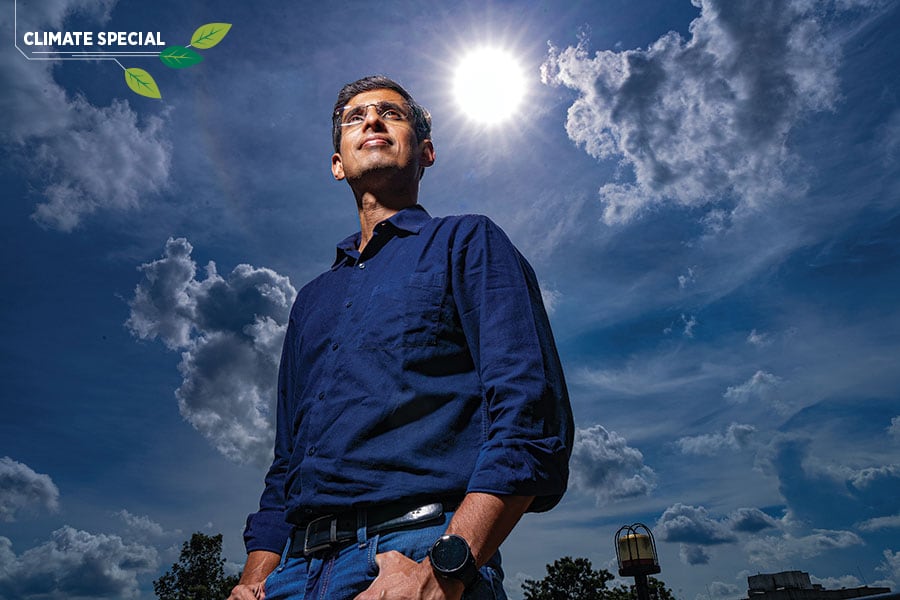 Rathish Balakrishnan, co-founder of social impact consultancy Sattva, believes that green jobs in India should also focus on the informal sector
Image: Selvaprakash Lakshmanan for Forbes India
Rathish Balakrishnan, co-founder of social impact consultancy Sattva, believes that green jobs in India should also focus on the informal sector
Image: Selvaprakash Lakshmanan for Forbes India
One of the biggest economic challenges for the Narendra Modi-led National Democratic Alliance (NDA) government, which was voted to power on June 4, is unemployment. And given India’s global commitments to a green transition over the next few years, these jobs will need to have a climate and sustainability lens.
In the 2014 elections, Modi had come to power on the promise of creating millions of jobs for the country’s youngsters. In the years that followed, while India has grown at a faster pace among major peers, the economy failed to generate enough jobs.
As the government works on job creation, an important focus will be to create new jobs that are climate- and sustainability-focused, and upskill the existing workforce to keep up with the country’s ambitious green transition goals.
At the 26th Conference of Parties (CoP26) in Glasgow in 2021, the prime minister had announced that India will achieve net-zero emissions by 2070. He also said that 50 percent of India’s energy demand will be met by renewables by 2030 and non-fossil energy capacity will be raised to 500 gigawatts. India has also committed to reduce 1 billion tonnes of projected emissions from now till 2030, and achieving carbon intensity reduction of over 45 percent over 2005 levels.
Decarbonisation of India by 2070 can potentially provide up to $15 trillion in economic opportunities and up to 50 million net new jobs, as per an October 2023 Green Industry Outlook report by TeamLease Digital. The estimations are based on five sectors: Energy, mobility, industry, green buildings and agriculture, along with cross-sector enablers like innovation in green technology, green finance, carbon sequestration and climate adaptation.
(This story appears in the 28 June, 2024 issue of Forbes India. To visit our Archives, click here.)




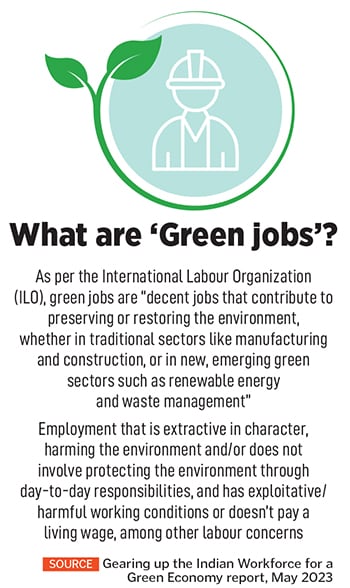 The report adds that by 2047, India has the potential to create 35 million green jobs, up from 18.52 million at present. The gig economy is also expected to create around 7 million jobs by 2030, showcasing a compound annual growth rate of 13.2 percent.
The report adds that by 2047, India has the potential to create 35 million green jobs, up from 18.52 million at present. The gig economy is also expected to create around 7 million jobs by 2030, showcasing a compound annual growth rate of 13.2 percent.
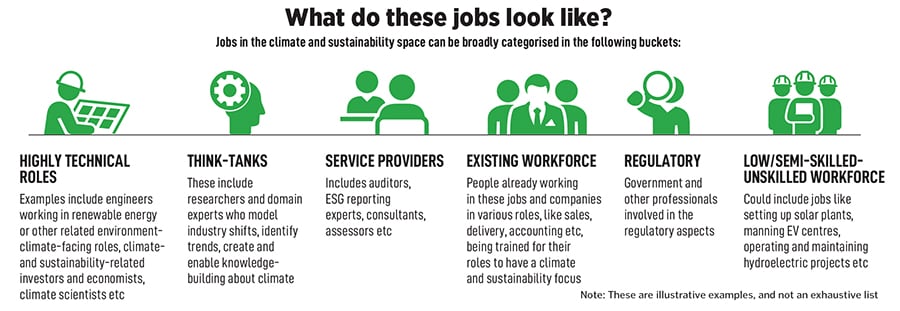
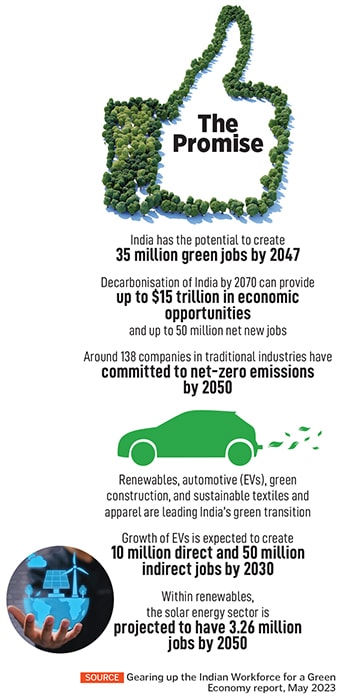 There is limited technical capacity to understand the multiple dimensions of expertise required for such [climate-related] initiatives and programmes, which is why we have not been able to create those jobs and hire for them, says Madhav Pai, CEO of the climate think-tank WRI India. “Only 10 percent of the demand potential is met as of today,” he adds.
There is limited technical capacity to understand the multiple dimensions of expertise required for such [climate-related] initiatives and programmes, which is why we have not been able to create those jobs and hire for them, says Madhav Pai, CEO of the climate think-tank WRI India. “Only 10 percent of the demand potential is met as of today,” he adds.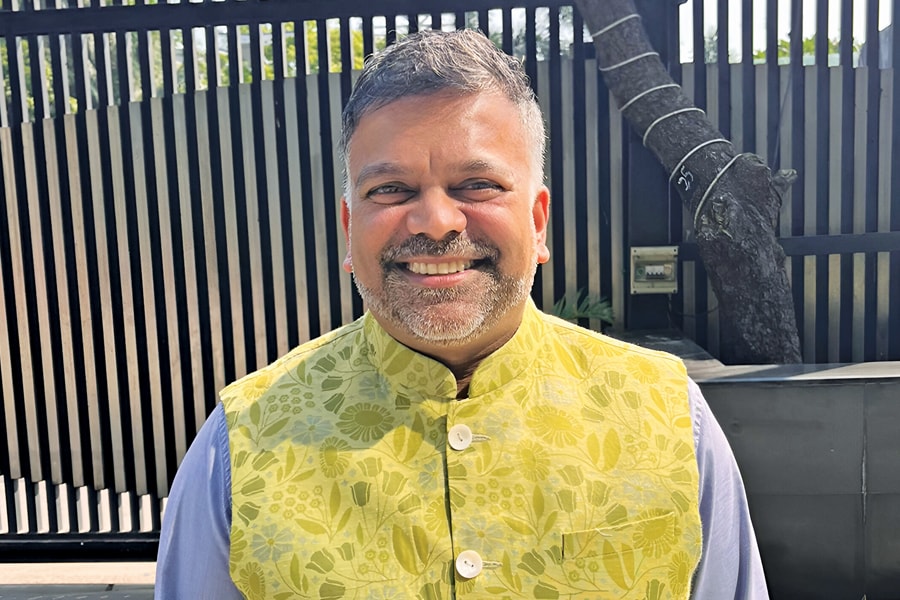

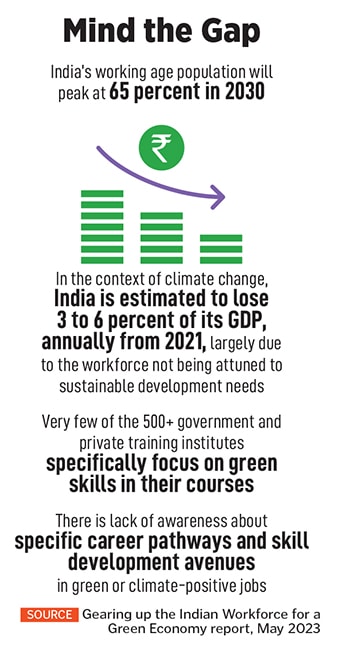 Staffing specialist Kamal Karanth, co-founder of Xpheno, says demand for sustainability-related jobs is mainly coming from multinational companies, consulting and real estate firms. The talent, right now, is only coming from metros—Delhi, Mumbai and Bengaluru—followed by a small fraction in Pune and Chennai.
Staffing specialist Kamal Karanth, co-founder of Xpheno, says demand for sustainability-related jobs is mainly coming from multinational companies, consulting and real estate firms. The talent, right now, is only coming from metros—Delhi, Mumbai and Bengaluru—followed by a small fraction in Pune and Chennai. 














